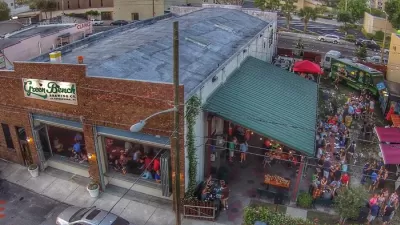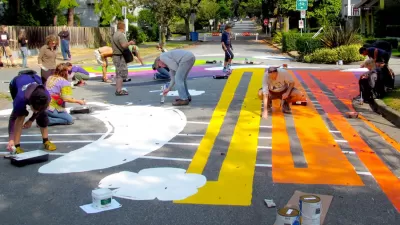Massachusetts is funding a placemaking initiative to renew its old industrial gateway cities. Available funds are only $16 million, but there's a plan to make the money go a long way.
Formerly consigned to rust belt obsolescence, postindustrial cities are rejuvenating around their gritty, pre-suburban charm. Massachusetts wants to extend the renewal of places like Pittsburgh, Brooklyn, and its own Boston to "gateway cities" across the state. Although the MassDevelopment fund lays claim to a mere $16 million, the Boston Globe's Paul McMorrow argues that might be enough to spur change.
Instead of funding development directly, the MassDevelopment initiative will tap into unique, contextual elements of the gateway cities, incubating projects that will maximize those assets and attract further investment. Says McMorrow: "From the canals in Lowell and Holyoke to New Bedford’s port to Malden’s classic downtown and Chelsea’s industrial architecture, Massachusetts’ smaller cities are full of the types of urban amenities that have catalyzed development in other cities. Most just haven’t put all the pieces together in a systematic way yet."
The MassDevelopment fund will reward three winning proposals identifying prime, walkable redevelopment districts. This is not meant to be development from scratch. The key is to recognize that "that these larger developments will only work if they’re tapping into a strong sense of place, and a workable local development vision."
FULL STORY: Turning around Mass. gateway cities

Study: Maui’s Plan to Convert Vacation Rentals to Long-Term Housing Could Cause Nearly $1 Billion Economic Loss
The plan would reduce visitor accommodation by 25,% resulting in 1,900 jobs lost.

North Texas Transit Leaders Tout Benefits of TOD for Growing Region
At a summit focused on transit-oriented development, policymakers discussed how North Texas’ expanded light rail system can serve as a tool for economic growth.

Why Should We Subsidize Public Transportation?
Many public transit agencies face financial stress due to rising costs, declining fare revenue, and declining subsidies. Transit advocates must provide a strong business case for increasing public transit funding.

How to Make US Trains Faster
Changes to boarding platforms and a switch to electric trains could improve U.S. passenger rail service without the added cost of high-speed rail.

Columbia’s Revitalized ‘Loop’ Is a Hub for Local Entrepreneurs
A focus on small businesses is helping a commercial corridor in Columbia, Missouri thrive.

Invasive Insect Threatens Minnesota’s Ash Forests
The Emerald Ash Borer is a rapidly spreading invasive pest threatening Minnesota’s ash trees, and homeowners are encouraged to plant diverse replacement species, avoid moving ash firewood, and monitor for signs of infestation.
Urban Design for Planners 1: Software Tools
This six-course series explores essential urban design concepts using open source software and equips planners with the tools they need to participate fully in the urban design process.
Planning for Universal Design
Learn the tools for implementing Universal Design in planning regulations.
Ascent Environmental
Borough of Carlisle
Institute for Housing and Urban Development Studies (IHS)
City of Grandview
Harvard GSD Executive Education
Toledo-Lucas County Plan Commissions
Salt Lake City
NYU Wagner Graduate School of Public Service




























